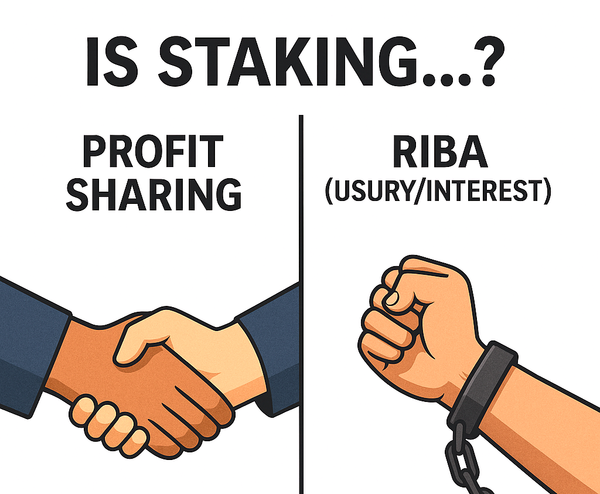Common Misconceptions About Crypto Being Haram
Asalamwalakum family, this post discusses some common misconceptions about Crypto in Islam. We wanted to hopefully change some minds and…

Asalamwalakum family, this post discusses some common misconceptions about Crypto in Islam. We wanted to hopefully change some minds and start some discourse around the subject. Crypto is an incredibly complex and profitable area of investing that our Ummah should be knowledgeable about because as we know, there aren’t very many sectors that are void of the Harams that ban us from being financially involved in certain areas.
Before starting, we’d like to state that we’re approaching this entire subject of crypto as an open conversation. We’re not here to pass fatwas or judge anyone’s opinions, just to share our own in a hopeful manner to initiate conversation.
Crypto is Haram because:
- It is far too volatile, the gharar is not permissible
There’s a common misunderstanding that gharar is “volatility” but gharar is “uncertainty” meaning you don’t know something about what you’re getting.
Imam al-Qarafi defines it as follows: “That which its occurrence is not known, whether its attributes and condition are known or not, like a bird in the sky or a fish in water. In both situations, the object of the transaction could be very well known and visible, but the risk and incertitude is related to the possibility of getting it or not.”
Many common resources are volatile like natural gas which jumped 20% in one day (something even the main crypto currencies like Bitcoin don’t do)
(More on Gharar on our other post)
2. It is not backed by any physical, tangible asset therefore is not a real asset/currency
USD hasn’t been backed by gold since 1973 and 90% of USD is digital. Try to go to a bank and try to withdraw $10,000 in cash, you’ll see how impossible the task is due to its simple lack of physical supply.
3. Crypto is used for illegal things like drugs and other Haram/illegal things
Crypto operates on blockchain technology, an information system that is 100% accessible and transparent to anyone. Using crypto for illegal things is the worst way to do so because of this traceable nature.
Also, USD is the single most used currency for illegal things and embezzlement, does that mean we should stop using USD? We think that crypto, like USD or other currencies, is a vehicle in which the user decides the outcome. The actual currency itself is not to blame. One can buy a bag of fruit or a bag of drugs with any form of currency.
In the past, fur and nuts were used to transact deals, were they haram back then too because they could’ve been used for Haram?
4. Crypto is an asset, not a form of payment like USD.
Crypto, especially ones with high speeds and low fees like Solana are used all over the globe as payment methods. Vendors like VISA / Shopify / Stripe (soon) / Paypal accept stablecoin payments as you would credit cards.
5. Memecoins are haram! They mean nothing and can’t be invested into
This is a complex topic. We’ll have research looking into this further, but it’s clear that not all cryptocurrencies are memecoins. They power real financial transactions.
6. Crypto isn’t endorsed by any central government and therefore isn’t real
Central governments endorse all sorts of things that go against Islam. There is no need for me to cite any particular reasons as we have an endless amount. Even those who do support crypto like El Salvador (and soon the US) still have other endorsements that go against Islam. This decision isn’t up to one sole entity to decide in terms of whether or not a currency is seen as tender.
We encourage all Muslims to take a more open look into Crypto and understand the good it can do for the Muslim Ummah.
Bitcoin (and many other cryptos but not all) are deflationary, have a fixed supply (with deflationary emissions), and cannot be manipulated in supply. Because of these characteristics, it goes against the current interest-empowering currencies such as USD.
Blockchain technology promotes honesty and transparency by operating as an open ledger. Anyone can see any transaction and this capability proves the idea that crypto is much more traceable than any other form of currency (and isn’t a viable form of illegal activity).
Digital payments via USDC help developing countries and failing currencies grow their wealth by self-custody and freedom of payment. Anyone can send any crypto anywhere at any time and no one can stop them. We send crypto to families in Indonesia via a charity because it takes 2 seconds, costs cents, and no one can freeze anything (for example see @telagacharity or @cryptozakat).
More and more countries, companies, and organizations are seeing crypto as a viable form of payment and digital asset class. Look into El Salvador, Argentina, recent US law updates, Nigeria, India, Visa & Shopify working Solana, and more.
That being said, we believe having the Muslim Ummah at the forefront of Crypto rather than lagging behind as we do in the traditional finance world is integral to the success of Halal investment products. The world is riddled with interest, gambling, p*rn, and other Haram that make investing incredibly hard for practicing Muslims. If there exists a way for Muslims to get ahead and cement themselves as leaders in an innovative and Halal industry such as Crypto, we should.
That starts with us doing our own research to learn what is/isn’t allowed in Crypto and then helping spread it where possible. Don’t just assume something is Haram and write it off, especially if it can empower the Ummah!
Resources; please read more than this post! There is a lot more to know before forming an opinion.




